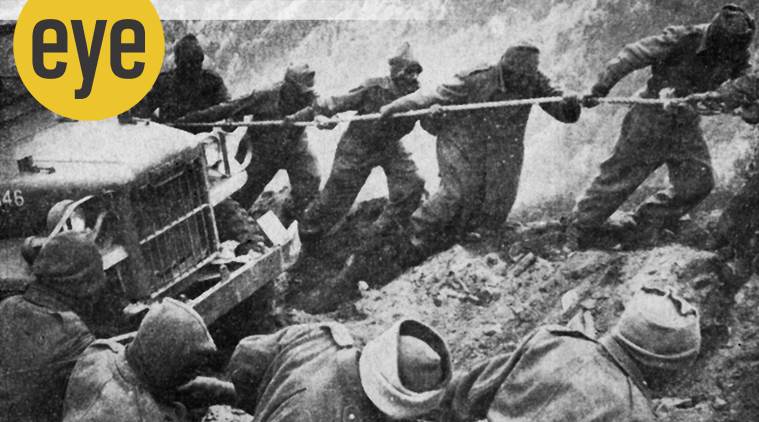 Indian soldiers drag a truck in NEFA during the 1962 Sino-Indian war. (Source: Express Archive)
Indian soldiers drag a truck in NEFA during the 1962 Sino-Indian war. (Source: Express Archive)
By Uttara Baokar
After 18 days of intense fighting, the war in Kurukshetra was over. In the palace, in my role as Gandhari in Andha Yug, I received news that my eldest son, Duryodhan, had been killed. I fell to the floor of the stage and wept. As a dark auditorium watched, Gandhari raised herself, gathered her sorrows and confronted Krishna. “Tum yadi chahtey toh ruk sakta tha yudh yeh (If you had wanted, you would have stopped this war),” she cried. The play, directed by MK Raina, was staged in 1986. Dharamvir Bharti wrote it in 1953, in the aftermath of the Partition and World War II.
At three, I did not realise the importance of freedom. I began to understand things during other wars — with China in 1962 and with Pakistan in 1965 — when loud, wailing sirens warned of air raids by Chinese or Pakistani aircraft. Entire cities plunged in darkness. People hid under beds, clutching one another. Everything could be obliterated in a flash.
But when the sun rose, we were out. Children played and adults worked. As common people, what alternative did we have? We are like Grusha, the servant girl of Bertolt Brecht’s The Caucasian Chalk Circle (1944) which we staged as part of the National School of Drama’s Repertory Company in 1968. She discovers a baby from a noble family that has been abandoned during a coup and picks him up before fleeing to the mountains. The child is a burden and young Grusha could give him up but doesn’t. Instead, she takes up the challenge to raise him in a way befitting his birth.
I hear of Indians doing great things across the world. Men and women leading IT sectors in the US. Students overcoming abject poverty and hunger to pursue their dreams. Despite lacking so many things, Indians are striving for a better life in every situation. We have faced dark years and many of us have learnt from the past. Leaders, unfortunately, have not. As a common person, how can I make rulers see this? How can I change their thinking? The Mahabharata is still going on. The people, who lead us all over the world, do not care. What do they want to gain from their power? Did thousands have to die because of the virus?
Theatre is a part of the life of this nation. I have acted in almost 50 plays and my latest was earlier this year, titled Letter from an Unknown Woman (1922), based on a German novella. We had two shows in Jaipur and one in Gwalior before COVID-19 put an end to public interactions. It revolves around a woman who is in love with a writer but, to him, she is just one in a series of one-night stands. What happens when she becomes pregnant makes up the soaring moments of the play. India is a traditional, patriarchal country but a play about a bold woman has found acceptance even in Tier-II cities. Surely, that says something about our evolution as a society.
I have not stepped out of home since March. The last time, I was locked in was in 1984. I was rehearsing for a play at the National School of Drama (NSD), where I had studied theatre under legendary director Ebrahim Alkazi, when news trickled in that Indira Gandhi had been assassinated. Riots started soon after. NSD is in Mandi House, several kilometres from my home in Karol Bagh. There were no buses plying. I walked. People were running on the roads. There were fires burning and rumours of mob violence. I focussed on reaching the safety of my home and, a couple of hours later, I did. When NSD reopened after the curfew, all of us were back at work.
We will come out of this pandemic as well because anything that begins has an end. The whole world is in this together, especially the common person. We have to wait. We will win this Mahabharata.